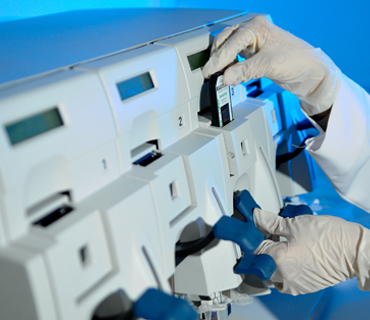Msc. in Molecular Medicine

Msc. in Molecular Medicine
Program Overview
Molecular medicine can be defined as the branch of biomedical science that studies, diagnoses and treats pathological conditions at the molecular level. This branch is readily evolving, encompassing emerging fields such as medical genetics, pathology, clinical diagnostics and companion diagnostics, nanomedicine, and immunology.
Technological advances in molecular biology and biomarker discovery and assessment have revolutionized the practice of clinical medicine over the past decade. To name a few, cancer immunotherapy, pathology, nanomedicine, gene therapy of inherited diseases, next-generation sequencing, and the engineering of biologic therapies.
Increasingly, research scientists, medical professionals and biomedical researchers in the health and life sciences must understand and evaluate advances in molecular medicine to keep abreast of developments in their fields and capably exploit this knowledge, emerging evidence, global challenges, and training in areas related to immunology, nanomedicine, and genetics.
The purpose of the Master of Science in Molecular Medicine program is to develop knowledge and skills in cellular and molecular biology, molecular diagnostics, and molecular mechanisms of disease. Graduates can implement their acquired skills and knowledge in both research and practical clinical work and will contribute to an increased understanding of pathological processes, diagnostics, biomarker discovery, molecular mechanisms, and treatment of diseases.
The College of Medicine and Medical Science (CMMS), Arabian Gulf University (AGU), while consolidating its undergraduate innovative educational programs, initiated postgraduate programs offering Ph.D. degree in molecular medicine in 2006. The current program, among other purposes, prepares and trains students who wish to enroll in the Ph.D. degree in molecular medicine.
This program has a strong focus on research providing a research-led teaching experience and is suitable for students with a background in biomedicine and molecular biology. The courses are designed to appeal to both clinical and basic biomedical scientists and provide comprehensive theoretical and practical training using state-of-the-art techniques in molecular and cellular biology as applied to medicine.
Vision
To be a unique, innovative, and effective educational and research program serving the health needs of the GCC citizens, and contributing globally to excellence in research and development, clinical services, and health education.
Mission
The Master of Science in Molecular Medicine program seeks to drive innovation in GCC in this emerging field of biomedical science, leading to measurable impact in discovery and healthcare quality, capitalizing on its interdisciplinary theme at the interface of molecular mechanisms of disease with medicine.
Program Objectives
- To acquire diverse and relevant modern skills, among them mastering selected techniques for analysis, measurements and manipulation of molecules involved in normal physiology and disease to improve diagnosis, treatment, and prevention of diseases.
- To professionally and competently express biomedical scientific findings in oral and written venues, and through the production of high-quality research communications.
- To obtain a theoretical basis of fundamental principles vital to understand and identify key molecules and biomarkers essential for normal physiological functioning and those related to deep-seated mechanisms of diseases.
- To conduct mission-oriented research directed to resolving a modern medical issue via in-depth investigations, and analysis of molecular mechanisms in disease and health.
Program Areas of Specialization
The Program offers specialties in the following areas:
- Molecular Genetics
- Nanomedicine
- Molecular Immunology
The master thesis should be specific to one of the three major areas of the program.
Learning Outcomes
By the end of this program, graduates should be able to:
- Demonstrate core knowledge of molecular and cellular biomedical sciences that intersect pathological, genomic, and immunological aspects of disease and health.
- Demonstrate working knowledge of normal human physiology at the molecular level and how these are distinguished in states of disease using a molecular marker/diagnostics approach.
- Demonstrate skills in basic biomedical, translational, or clinical molecularly focused research, depending on selected focus.
- Demonstrate practical knowledge and skills that allow the student to identify molecular disease mechanistic and diagnostic features.
- Demonstrate effective oral and written communication skills.
- Demonstrate the ability to interact and work effectively with others in a professional setting.
- Demonstrate professional ethics necessary for the responsible conduct of biomedical research.
- Demonstrate other “soft” professional skills (e.g., critical thinking, problem solving, career planning, networking) that facilitate career direction, advancement, and commitment to life-long learning.
- Be able to draft an individual career development plan.
